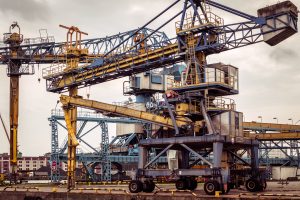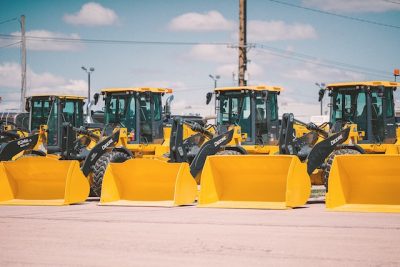From trucks and bulldozers to cranes and generators, managing a diverse range of vehicles and construction equipment can be improved with the right fleet management solution. A fleet that’s efficient and well-maintained has a significant impact on project timelines, budget, and overall success.
In recent years, improvements to fleet management workflows have transformed construction, revolutionizing the way assets are handled and improving best practices across the entire industry.
For example, modern fleet management systems provide real-time data on vehicle location, fuel consumption, maintenance schedules, and more, enabling organizations to make informed decisions about their operations. These solutions not only help reduce operational costs, they also contribute to increased productivity and efficiency.
Furthermore, recent innovations have made it easier for companies to monitor and maintain compliance with regulatory requirements, thereby mitigating risks and ensuring the safety and integrity of their fleet. Indeed, the integration of advanced fleet management solutions is reshaping the commercial construction industry, driving it towards a future of innovation, efficiency, and success.
Types of Fleets in Commercial Construction

Construction projects rely on a variety of vehicles and equipment to successfully complete jobs. Each type of vehicle or equipment plays a specific role in the construction process, and managing them efficiently is critical to the success of a project. The diverse range of assets in a construction fleet can include:
- Trucks and Trailers: To transport materials and equipment.
- Bulldozers and Excavators: For site preparation and excavation.
- Cranes: For lifting heavy materials and equipment.
- Concrete Mixers: To prepare and transport concrete.
- Generators and Lighting Equipment: To provide power and lighting on construction sites.
- Compactors and Rollers: For soil and asphalt compaction.
- Pavers: To lay asphalt or concrete on roadways and other surfaces.
Proper fleet management ensures that the right assets are available at the right time and in the right condition, preventing delays and reducing downtime. It also helps to optimize how and when assets are used to improve ROI.
Efficient fleet management also helps monitor and maintain the health of vehicles and equipment, extending their lifespan and reducing maintenance costs. It also ensures compliance with safety and regulatory requirements, mitigating risks and ensuring the safety of the workers and the public.
Challenges in Managing Construction Fleets

Managing construction fleets involves overcoming various challenges that can significantly impact project timelines and costs. Some of the common challenges faced by construction companies include:
- Vehicle Maintenance: Ensuring that all vehicles and equipment are in good working condition and are available when needed.
- Fuel Management: Monitoring fuel consumption and controlling fuel costs.
- Compliance: Adhering to regulatory requirements and ensuring that all vehicles meet the necessary safety standards.
- Asset Utilization: Optimizing the use of each vehicle and piece of equipment to maximize productivity and minimize idle time.
- Data Management: Collecting and analyzing data to make informed decisions regarding fleet operations.
These challenges, if not properly addressed, can lead to project delays, increased operational costs, and decreased profitability. Inefficient fleet management can also result in unscheduled maintenance, downtime, and the risk of non-compliance with regulations, which can have severe implications for construction companies.
Innovations in Fleet Management Systems

To overcome the multitude of challenges faced in managing construction fleets, innovative fleet management systems serve as a pivotal solution. These systems utilize a combination of hardware and software to collect, process, and analyze data from vehicles and equipment, providing invaluable insights that can be used to optimize fleet operations, reduce costs, and enhance project management.
The workings of fleet management systems involve the use of GPS technology, sensors, and telematics devices installed in vehicles and equipment to collect real-time data on their location, speed, fuel consumption, engine status, and more. This data is then transmitted to a centralized platform where it is processed and analyzed to provide actionable insights.
The data collected by fleet management systems can be utilized in various ways to improve construction fleet operations, such as:
- Route Optimization: Analyzing data on traffic conditions, road closures, and job site locations to determine the most efficient routes for vehicles.
- Preventive Maintenance: Monitoring vehicle health and performance data to schedule timely maintenance, thereby preventing breakdowns and extending the lifespan of assets.
- Fuel Management: Tracking fuel consumption patterns to identify opportunities for reducing fuel costs.
- Compliance Management: Ensuring that vehicles meet regulatory requirements and that drivers adhere to safety standards.
- Asset Utilization: Analyzing utilization data to optimize the deployment of vehicles and equipment, ensuring that the right assets are available at the right time and place.
The advantages of using fleet management systems in commercial construction are manifold. These systems not only contribute to significant cost savings by optimizing fuel consumption, reducing maintenance costs, and minimizing idle time but also enhance project management by ensuring that assets are utilized efficiently and are available when needed.
Furthermore, fleet safety management systems like CameraMatics aid in compliance management, thereby reducing the risk of penalties and legal issues. In essence, the adoption of fleet management systems is essential for construction companies seeking to streamline their operations, reduce costs, and ensure the successful completion of projects.
Final Thoughts
The adoption of fleet management systems is crucial in addressing the common challenges faced in managing construction fleets. These systems optimize fleet operations, enhance project management, and contribute to significant cost savings.
The actionable insights provided by the data collected can improve vehicle maintenance, fuel management, and compliance, ultimately ensuring the success of commercial construction projects.












